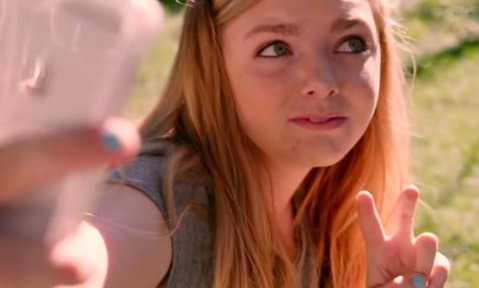This viewer saw Eighth Grade with a capacity festival crowd ready to have a good time at the movies. Burnham was a stand-up comedian before he was a wunderkind writer/director, so his debut is not without humor and well-timed jokes. However, as the laughs filled the theater, one had to wonder how anyone could’ve had a reaction beyond cringing discomfort. Burnham and Fisher expertly turn Kayla into an open wound, salted every time someone devalues a person who already holds themselves in low esteem. Her discomfort is palpable, displayed in her posture and expression. Burnham hasn’t made some miserabilist tract, but the Lars von Trier version of Eighth Grade is only a few steps in one direction. This is a tough film to watch, prompting hands over eyes and contracting joints.
Part of Kayla’s torture comes from how unexceptional she appears to be. Her skin is bad in the way that most 14 year-olds skin is (an extra dose of realism far removed from Disney Channel airbrushing), but it’s no worse than her greasy classmates. She performs confidence on her various social media platforms, knowing the right words and phrases that would allow her to melt into everyone else. In middle school, where the social incentive is assimilation, she has assimilated, so why is she so alone? This cruelty plagues the viewer as much as it plagues Kayla. A truism in coming-of-age films is sad-kids-are-sad, and Eighth Grade has that signed in its yearbook.
Kayla’s flattening of her persona is where Burnham’s film becomes almost journalistic. He has spoken in interviews about the research into the internet lives of eighth grade girls he did in the lead up to his film, and the fruits of his labor are onscreen. Kayla might be alone because she has gotten so good at imitating what the culture wants a girl her age to be, namely someone who’s obsessed with their appearance and who parrots the same tired clichés about self-actualization. This person Kayla’s trying to be is a big nothing, an empty vessel to be filled up with make-up tutorials and marketing-speak, while the boys are made into husks motivated by porn and violence. In Burnham’s interpretation, the internet as it exists is training kids for an authoritarian takeover. They have no expectation of privacy, they can acclimate to anything based on the school shooter drills they eventually go through, and their value can be distilled into a small series of numbers, numbers which they care deeply about improving. Eighth Grade presents a depressing view of the future, the supreme triumph of advertising’s pernicious influence on a new generation of humans who’ve lived their lives being lulled to sleep by the soft glow of their phones.
Within this tech hellscape, Kayla’s experiences aren’t that unique to her time, at least as far as teen films are concerned. The hot guy’s a vapid moron. The cool girl is casually mean. The teachers are clueless, covering themselves in out-of-date slang in futile attempts to connect, and the parent, earlier ignored, was there the whole time. These tropes get used, sure, but they recur because they’re powerful when done right, and Burnham is as skilled an observer of what’s cinematically come before as he is of how kids live their lives today. Eighth Grade never feels derivative, and is instead so vital that it makes the viewer forget that the film contains shorthanded characters. This is largely because of Fisher’s performance and inhabitiation of Kayla, a unique protagonist in a sea of coming-of-age films. It’s her that makes so much of the film so deeply felt, with every slight visibly hardening her heart and every social opportunity being digested like a month’s worth of sustenance. She makes it easy for the viewer to want good things for her, even as it seems like those opportunities are getting further and further apart.
Eighth Grade posits that the greatest loss for Kayla is that of her optimism. A time capsule from a few years earlier plays a late role, and the viewer can recognize the voice that comes out of it as the same one that Kayla is impersonating in her YouTube videos. Where it earlier came naturally, now it’s a put-on. The great tragedy of the film is how easily that kind of hope and effervescence can be devalued and snatched away within a few years’ time. Burnham provides plenty of ways such a thing can happen, ways that probably didn’t exist for the last generation of eighth graders and ways that have existed for as long as fourteen-year-old girls have existed. If his film is on the cutting cultural edge, his remedies are as old-fashioned as the price of kindness. It costs nothing for someone to give it, just as it’s free to allow oneself to be vulnerable and receive it. It’s an old-fashioned message and a welcome respite from the cheap dopamine hits of likes and views. A-

 RSS Feed
RSS Feed